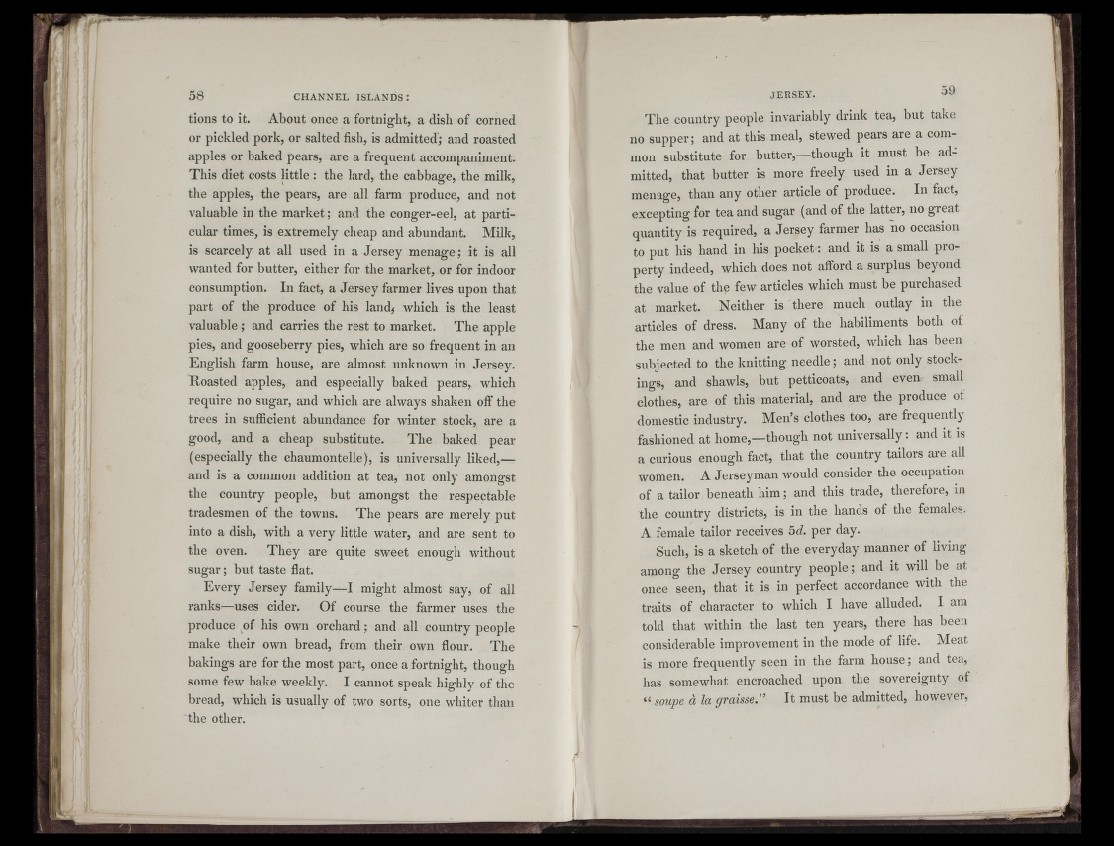
IItions
to it. About once a fortnight, a dish of corned
or pickled pork, or salted fish, is admitted'; and roasted
apples or baked pears, are a frequent accompaniment.
This diet costs little : the lard, the cabbage, the milk,
the apples, the pears, are all farm produce, and not
valuable in the market; and the conger-eel, at particular
times, is extremely cheap and abundant. Milk,
is scarcely at all used in a Jersey menage; it is all
wanted for butter, either for the market, or for indoor
consumption. In fact, a Jersey farmer lives upon that
part of the produce of his land^ which is the least
valuable ; and carries the rest to market. The apple
pies, and gooseberry pies, which are so frequent in an
English farm house, are almost unknown in Jersey.
Roasted apples, and especially baked pears, which
require no sugar, and which are always shaken off the
trees in sufficient abundance for winter stock, are a
good, and a cheap substitute. The baked pear
(especially the chaumontelle), is universally liked,—
and is a common addition at tea, not only amongst
the country people, but amongst the respectable
tradesmen of the towns. The pears are merely put
into a dish, with a very little water, and are sent to
the oven. They are quite sweet enough without
sugar; but taste flat.
Every Jersey family—I might almost say, of all
ranks—uses cider. Of course the farmer uses the
produce of his own orchard; and all country people
make their own bread, from their own flour. The
bakings are for the most part, once a fortnight, though
some few bake weekly. I cannot speak highly of the
bread, which is usually of two sorts, one whiter than
the other.
I
The country people invariably drink tea, but take
no supper; and at this meal, stewed pears are a common
substitute for butter,—though it must be admitted,
that butter is more freely used in a Jersey
menage, than any other article of produce. In fact,
excepting for tea and sugar (and of the latter, no great
quantity is required, a Jersey farmer has no occasion
to put his hand in his pocket: and it is a small property
indeed, which does not afford a surplus beyond
the value of the few articles which must be purchased
at market. Neither is there much outlay in the
articles of dress. Many of the habiliments both of
the men and women are of worsted, which has been
subjected to the knitting needle; and not only stockings,
and shawls, but petticoats, and even small
clothes, are of this material, and are the produce ot
domestic industry. Men’s clothes too, are frequently
fashioned at h om e ,— though not universally: and it is
a curious enough fact, that the country tailors are all
women. A Jerseyman would consider the occupation
of a tailor beneath him; and this trade, therefore, in
the country districts, is in the hands of the females.
A female tailor receives 5d. per day.
Such, is a sketch of the everyday manner of living
among the Jersey country people; and it will be at
once seen, that it is in perfect accordance with the
traits of character to which I have alluded. I am
told that within the last ten years, there has been
considerable improvement in the mode of life. Meat
is more frequently seen in the farm house; and tea,
has somewhat encroached upon the sovereignty of
“ soupe d la graisse” It must be admffted, however.